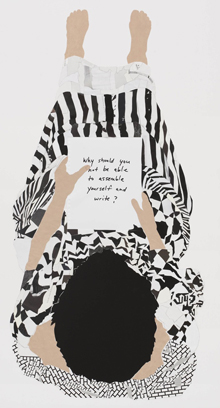EXHAUSTION
& EXUBERANCE
Ways to Defy the Pressure to Perform
by Jan Verwoert
(...)
an existential exuberance, i.e., a way to perform without any mandate or legitimation, in response to the desires and dreams of other people, but without the aim or pretense of merely fulfilling an existing demand. It is a way of always giving too much of what is not presently requested. It is a way of giving what you do not have to others who may not want it. It is a way of transcending your capacities by embracing your incapacities and therefore a way to interrupt the brute assertiveness of the I Can through the performance of an I Can’t performed in the key of the I Can. It is a way of insisting that, even if we can’t get it now,we can get it, in some other way at some other point in time.
(...)
One way to acknowledge the debt is to pay tribute to those who have enabled you to practice what you do by inspiring you. With regard to inspiration, the I Can is realised in a very particular way because another person’s thoughts, works or conversation make you experience the liberating sensation of potentiality that, yes, you can also think, feel, speak and act this way. To feel inspired essentially means to realise I Can because You Do. Any form of work that unfolds through addressing the work of others (including this essay) thrives on this sensation. To put the moment of inspiration into practice and act upon the implications of the realisation that I Can because You Do involves transforming the debt to the other into a pro-active gesture of dedicating one’s practice to this other. Overcoming the fear of influence, we could then move towards a politics of dedication.
The work of Frances Stark thrives on such a politics of dedication. In both her visual and written work she continuously borrows and quotes and transforms what she borrows and quotes. Yet, the gesture of appropriation in her work, as much as it always echoes an act of stealing, first of all communicates a sense of appreciation that precisely reflects the conversion of a debt into a dedication. The space her
work opens up is an open continuum in which other voices resonate through her voice, but where her voice remains very distinctively hers.
(...)
So the question is rather how performing the I Can’t could effectively interrupt the self-contained economic cycle of supply and demand and truly break the spell of the pressure to produce for the sake of production. Punk was exactly about this: the unwillingness to submit to industry standards of what music can or can’t be and how professional musicians should deal with what they can or can’t do. This resulted in the transgression of personal capacities by rigorously embracing personal incapacities, rising above demand by frustrating all expectations. In this respect, Stuart Bailey pointed out the iconic status that the closing moment of the Sex Pistols’ final performance: In the video recording of the show, the band are visibly drained of energy as their last song “No Fun” drags on into an endless coda, and their wild posturing routine terminally exhausts itself. As the performance disintegrates completely and ends, singer Johnny Rotten, visibly alienated by both the band and the whole situation, sneers at the audience: “Ever get the feeling you’ve been cheated?”. At the point of exhaustion, the performance of the I Can’t interrupts the economy of expectations and throws its workings into relief, producing an empty moment of full awareness.
(...)
Bizarrely then, the heartfelt belief that “it’s better to burn out than to fade away” that used to set the rebellious devotees of countercultural creativity apart from obedient employees, now seems to have become the first commandment of the high performance culture endorsed by advanced captitalism.
(...)
What would it mean to escape this vicious cycle and break the spell of the death drive towards exhaustion?
fredag 22. april 2011
Abonner på:
Legg inn kommentarer (Atom)


Ingen kommentarer:
Legg inn en kommentar